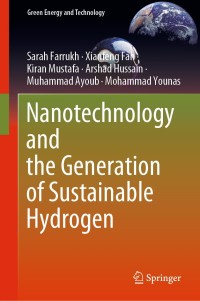Buy Nanotechnology and the Generation of Sustainable Hydrogen PDF ebook by author Sarah Farrukh; Xianfeng Fan; Kiran Mustafa; Arshad Hussain; Muhammad Ayoub; Mohammad Younas – published by Springer in 2021 and save up to 80% compared to the print version of this textbook. With PDF version of this textbook, not only save you money, you can also highlight, add text, underline add post-it notes, bookmarks to pages, instantly search for the major terms or chapter titles, etc.
You can search our site for other versions of the Nanotechnology and the Generation of Sustainable Hydrogen PDF ebook. You can also search for others PDF ebooks from publisher Springer, as well as from your favorite authors. We have thousands of online textbooks and course materials (mostly in PDF) that you can download immediately after purchase.
Note: e-textBooks do not come with access codes, CDs/DVDs, workbooks, and other supplemental items.
eBook Details:
Full title: Nanotechnology and the Generation of Sustainable Hydrogen
Edition:
Copyright year: 2021
Publisher: Springer
Author: Sarah Farrukh; Xianfeng Fan; Kiran Mustafa; Arshad Hussain; Muhammad Ayoub; Mohammad Younas
ISBN: 9783030604028, 9780429536410
Format: PDF
Description of Nanotechnology and the Generation of Sustainable Hydrogen:
This book explains the aspiring vision of a sustainable hydrogen generating system which employs nanotechnology one way or the other and presents a detailed update on research activities, achievements and challenges. It explores how nanotechnology is reshaping science in general and how this can be applied to the generation and storage of hydrogen energy. This book begins by highlighting the importance of hydrogen a source of sustainable energy and its impact on the technical advances of fuel cells, internal combustion engines, batteries and power plants. The book depicts the role of nanotechnology in the development of sustainable hydrogen. Comprehensive studies on various nanotechnologies involved in hydrogen generation are discussed in separate chapters, representing a complete picture of hydrogen generation utilizing nanotechnology. This book serves as a useful research tool for academics and practitioners looking towards new ways to develop and consume energy, without conceding our environment. Providing the advantages and disadvantages of each technology discussed, this book shows the benefits of utilizing nanotechnology in this field.





